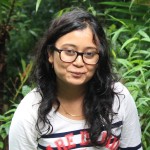Swagata Das

Name: Swagata Das
Department: Graduate School of Engineering, Program in System Cybernetics
Course: Technical Creation Course
Research Field: Remote Health monitoring for Senior Citizens
Supervisor: Associate Professor Yuichi Kurita
Career and Academic Background before TAOYAKA Program
As a student, I tried to become a prospective contributor to the field of engineering when I started my undergraduate education at the age of 17, specialized in the stream of Electronics and Communication Engineering from North Eastern Regional Institute of Science and Technology, Arunachal Pradesh, India.
After completing under-graduation as a gold medallist, I continued my education with masters in Electronics Design and Technology from Tezpur University, Assam, India. The second year of my Masters was covered as a trainee engineer at CSIR-CEERI, Pilani where I worked on a Brain Computer Interaction project based on MATLAB intended to assist immovable or paralysed patients. At CEERI, I came across several learned scientists who inspired me to continue my research work, extending my knowledge to a wider extent.
During under-graduation, I also got an opportunity to publish a paper on ‘Performance of a Hybrid MRC/SC Diversity receiver over Rayleigh Fading Channel’ at an IEEE conference held at Bengaluru, India in 2013. In addition, I have contributed in writing a book on ‘Real time Robot Control uses Brain Computer Interaction’ during my masters to be published soon by my research guide at CEERI.
Research Plan in TAOYAKA Program
During TAOYAKA program, I plan to target a remote health monitoring system that can be used in sheer emergency situations by elderly people with the help of which they can take good care of themselves without being dependent on other individuals all the time.
Ageing is an inevitable worldwide phenomenon. India is forecasted to have an approximate count of 173.18 million of elderly people by the year 2026 according to a United Nation census. Studies show that ageing results long term healthcare public investments. Therefore, ensuring an effective healthcare system along with efficient and high-quality services to elderly people is an extreme necessity.
Majority of the elderly population are either dependent or living in vulnerable situations suffering from reduced mobility and also want to avoid long costly hospital stay, precisely in disadvantaged areas. Wireless communication based technologies may allow elderly people, and, in general people with limited mobility (for e.g. People living in rural areas) to remotely access healthcare services, overcoming geographical barriers and ensuring good quality services to needy people. Generally called as E-healthcare systems, these can be targeted to a large target group monitored by limited skilled helpers in a simultaneous fashion.
Career Plan after TAOYAKA Program
TAOYAKA is a beautifully designed program which has a coverage of social, cultural and technical aspects of implementation of research. After gaining my degree in Japan under TAOYAKA program, I anticipate myself as an experienced and a well―balanced personality able to focus on real life issues of the society. I plan to move back to my own country and join companies that aim at rural development and advancement of disadvantaged areas directly or indirectly. Since I have not yet gained any working experience, I want to start my career after graduation by acquiring some practical knowledge in core companies. Later I want to lay my focus primarily on all round development of dis-advantaged areas in India through technical contributions be it through the means of an already existing private organization or through government oriented organizations.





